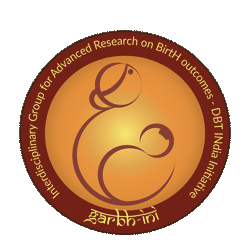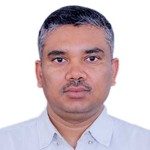Principal Investigator
Dr. Shinjini Bhatnagar
Present Research Interest
As a Senior Research Scientist and Pediatric Gastroenterologist at the Centre for Diarrheal Diseases and Nutrition Research, Department of Pediatrics, All India Institute of Medical Sciences, New Delhi, we conducted hypothesis driven studies that evaluated interventions directed at host responses in morbidity related to infections. Our research was primarily to facilitate evidence based recommendations in child health for global and national policy; algorithm for treatment of persistent diarrhea, low osmolarity oral rehydration salts solution and zinc in treatment of diarrhea. We participated in developing the clinical and research discipline of Pediatric Gastroenterology at AIIMS.Current Research Interest
The predominant direction of our research is to conduct hypothesis driven and hypothesis generating studies that will facilitate development of knowledge based interventions and public health tools for child health. The broad focus is in the domain of molecular mechanistic causality of neonatal and infant infections particularly with reference to host responses and the potential interventions. Components of the immune system may be permanently programmed by events in fetal and early peri-or neonatal life which would have post-natal consequences. In order to study this hypothesis further we are doing immunological characterization of cord blood and early infancy, in full-term appropriate- and small-for-gestational age neonates, to examine the status of immune system maturation in a situation of intrauterine growth retardation; we are also evaluating other potential modifiers of the immune system maturation and development. Our other immediate objective is to understand if micronutrient supplementation or modification of the host gut flora can affect the host immune response to vaccines in early post natal life; an important public health issue in our country and other low and middle income settings where the efficacy of oral vaccines is poor.In India, more than a quarter of the one million neonatal deaths are attributed to serious bacterial infections that include pneumonia, sepsis and meningitis. These severe infections are also a major cause of hospitalization in young infants. The outcomes of these infections in early infancy are poor. Interventions that can immediately improve the efficacy of existing standard therapy of serious bacterial infection in low resource settings are a high priority. We propose to study the biology of serious bacterial infections and evaluate interventions that can influence host responses to infections. As an immediate objective we propose to study the possible effects of micronutrients on host responses in infections amongst young infants.
Poor responses to vaccines in developing countries have impeded attempts at disease eradication or control. An initial program in this domain is to evaluate if micronutrients supplementation or factors that alter intestinal flora influence host immune responses to vaccines given at birth.
Another research focus is to develop diagnostics and low cost health products for childhood diseases. As an initial step in that direction we are developing a rapid in-house point of care test for diagnosis of celiac disease (CD) in partnership with International Centre for Genetic Engineering & Biotechnology, All India Institute of Medical Sciences and an industry.
Co-Principal Investigator
Dr. Partha P Majumder
Biography
Professor Partha Pratim Majumder has completed his PhD from the Indian Statistical Institute, Kolkata. In the course of his extensive and distinguished academic career, he has served in various positions in University of Texas, Indian Statistical Institute, University of Pittsburgh, Jawaharlal Nehru Centre for Advanced Scientific Research and Indian Institute of Science Education & Research. He was the Founder Director of the TCG-ISI Centre for Population Genomics, and also of the National Institute of Biomedical Genomics. Presently, he is a Distinguished Professor at NIBMG, Emeritus Professor at Indian Statistical Institute, Adjunct Professor of the Translational Health Science & Technology Institute and Regional Centre for Biotechnology. He is currently the President of the Indian Academy of Sciences and the West Bengal Academy of Science & Technology.Research Interest
Human Genome Variation: I am interested in reconstruction of human movements using genomic data, inferring genetic structures of population groups and admixtures among them, and using these inferences to understand genetic epijdemiolgy of disease. Statistical Genomics: I am interested in developing statistical methodologies and applying statistical methods in genetics. Genetics and Genomics of Disease: I am interested in drawing inferences on genetic bases of human diseases and adverse life events using data on families, relative pairs and unrelated individuals. My current focus is on cancer and pre-term birth.Dr. Dinakar Salunke
Biography
Karnataka University, Dharwad, India, BSc (Physics, Mathematics and Statistics), 1976 Karnataka University, Dharwad, India, MSc (Physics), 1978 Indian Institute of Science (IISc), Bangalore, India, PhD, 1983 Brandeis University, Waltham, Massachusetts, USA Postdoc, 1988Scientific Activity
Understanding the physiological processes of self-nonself discrimination in terms of physicochemical principles of molecular interactions has been a major focus of our research. Our work on the pluripotency of primary immune response led to discovering new ways of antibody degeneracy and has impacted the evolving paradigm shift in immune recognition and generation of antibody repertoire [Immunity (2006) 24:359]. We have analyzed how immune system reacts when encountered with the antigens that keep changing shape and showed that the restricted paratope conformational repertoire on binding of an antigen to multiple independent antibodies may be relevant for minimizing possibility of selfreactive antibodies. Molecular insights into the functional mimicry in the context of immune response were addressed using structural, immunological and thermodynamic approaches. We have demonstrated how paratope plasticity facilitates molecular mimicry of otherwise unrelated antigens. While our analyses of carbohydrate-peptide mimicry provided important conceptual leads towards design and development of new generation of vaccines, the analyses involving carbohydrate-porphyrin mimicry provided possible mechanistic understanding of the molecular pathology of porphyria. Structural issues pertaining to innate immunity and food allergies are also being addressed.Interdisciplinary Team
Dr. Uma Chandra Mouli Natchu
Dr. Nitya Wadhwa
Biography
I trained as a paediatrician and after practicing for a few years,transitioned to become a physicianscientist.I have been doing clinical research for more than a decade and lead my research programme at THSTI. In my initial years as a researcher at AIIMS-New Delhi, I was involved with the conduct of hypothesis driven studies that evaluated interventions directed at several commonly occurring infections in children in India. I was groomed in the skills required for conducting rigorous and meaningful research. In 2010, I joined Translational Health Science and Technology Institute as a physician-scientist.I have been associated with several large multi-centre clinical trials using zinc for treatment of various childhood illnesses, surveillance for H-influenzae B in tertiary hospitals, establishing a large cohort of pregnant women to find solutions for adverse pregnancy outcomes, and observational studies to understand the development and maturation of the neonatal immune system. My primary research interest is finding solutions for neonatal and early life morbidity and mortality.I am the PI for a large multi-country multi-centre clinical trial to measure the efficacy of adjunct zinc for the treatmen of young infant sepsis and co-PI on another large multi-country multi-site clinical trial to test the efficacy of immediate continuous KMC in reducing neonatal mortality.I have been instrumentalin establishing a large longitudinal cohort of pregnant women for risk stratification of the women with adverse outcomes and am overseeing the conduct including the data management of the cohort. I have demonstrated my ability to establish, maintain and follow population and hospital cohorts with high quality data. My core expertise lies in design, conduct and analysis of hypothesis driven multicentre hospital based clinical studies. I have the competence to build and lead multisite, multidisciplinary research teams that are capable of performing research to the most exacting standards of good clinical and ethical practices and to use risk and decision science for clinical medicine and public health.
I have authored many publications including one in Lancet and have co-authored chapters in text books. I have been credited with the development of revised Consensus guidelines for the management and treatment of diarrhoea in children for NRHM (2006 & 2007)as member of National Indian Academy of Paediatrics (IAP) and Management of Severe Acute Malnutrition (2006).
Data Management Centre (DMC): Instrumental in establishing the data management centre (DMC) at the Paediatric Biology Centre (PBC) of THSTI and lead the data management for all clinical studies being conducted and coordinated by PBC.
Supported in establishing the Institutional Ethics Committee for Human Research at THSTI and in the registration of the IEC with CDSCO. Was a member secretary for the THSTI IEC for the first few years.
Teaching: Coordinate the coursework on ‘Quantitative Methods in Research’ and ‘Clinical Trials’ for PhD students at THSTI. I am also a faculty for CDSA conducted workshops on Good Clinical Practice and Ethics in Biomedical Research
Clinical Operations at Clinical Development Services Agency (CDSA): Since 2017, I have an additional responsibility of CDSA operations. In this short span, CDSA has been awarded one collaborative grant with multiple interdisciplinary institutions and a consultancy for clinical trial regulatory and data safety advise. I am also a part of a number of key efforts (clinical trials toolkit, integrated electronic research application platform, online e-courses) to enhance the Indian clinical research ecosystem.
Dr. Pallavi Kshetrapal
Biography
Dr Pallavi Kshetrapal is a molecular geneticist who obtained her PhD degree from Centre for Cellular and Molecular Biology (CCMB), Hyderabad and post-doctoral research training from Harvard Medical School Boston, USA. The focus of her lab is to study molecular pathways that are clinically relevant in adverse pregnancy. Using a range of different “omics’ approaches, studies that are described below, the lab is focused towards identification of biomarkers from human circulating blood and from human placenta that can be utilised for development of translational modalities against adverse pregnancies.Biomarker discovery for prediction of pregnancy complications and adverse pregnancy outcomes
Dr. Pallavi Kshetrapal’s lab is currently involved in identification and validation of biomarkers circulating in maternal bodily fluids associated to adverse pregnancy outcomes. The methodology involved utilises agnostic multi-pronged “omics” approach. Identified molecular signatures would then be validated and developed as potential biomarker/s for determination of risk assessment in a pregnant mothers. A classification algorithm based on various clinical and molecular determinant/s from mutltivariate data generated in a longitudinal cohort study may lead to generation of better models of risk stratification for assisting clinical interventions.
Understand the cellular and biochemical pathways functioning in the human placenta for maintaining a healthy pregnancy
Placenta is a feto-maternal organ and is known to govern the outcome of pregnancy. In another ongoing study her lab intends to emphasize the use of circulating placenta-specific extracellular vesicles for diagnosing the adverse pregnancy outcome. These vesicles are being studied to identify the enveloped cargo capable of transducing signals from and to the fetus for healthy growth and development. Dr. Pallavi Kshetrapal’s lab is interested in identification and validation of placenta-specific markers in maternal circulation in normal and complicated pregnancies. They plan to use in vitroapproaches to highlight the putative utility of such tissue-specific extracellular vesicles (e.g. exosomes) in the prediction of adverse pregnancy outcomes and for treatment monitoring by studying the change in the placental function as the pregnancy progresses.
Dr. Tushar K Maiti
Dr. Tushar K Maiti Associate Professor E-mail: tkmaiti at rcb dot res dot inPostdoc at Nagoya Institute of Technology (Japan), Purdue University (USA), and Weizmann Institute of Science (Israel) PhD 2005, Indian Institute of Technology Associate Professor
Dr. Arindam Maitra
Biography
I have undertaken my doctoral research on genomic diversity of HIV-1 in India in the All India Institute of Medical Sciences, New Delhi. Subsequently, I have been engaged as Technical Support Scientist in Applied Biosystems as a member of European Task Forces on high throughput sequencing, gene expression, genotyping and forensic DNA analysis. Subsequently, I have also been Group Leader of Genomics in The Centre for Genomic Application (TCGA), New Delhi and Head of Functional Genomics in Thrombosis Research Institute, Bengaluru. Presently, I am an Associate Professor in National Institute of Biomedical Genomics. I am also the Coordinator of Core Technologies Research Initiative of NIBMG, Project Coordinator of the International Cancer Genome Consortium – India Project at NIBMG, Adjunct Faculty of Regional Centre for Biotechnology and Guest Lecturer of Department of Biochemistry, University of Calcutta.Research Interest
My research mission is to harness genomics to uncover important and novel information on human health and disease. The emergence of techniques like massively parallel DNA sequencing methods (MPS) has revolutionized our ability to identify causal genomic variants in various human health conditions. Exome and whole genome sequencing based approaches have already been shown to be successful in uncovering the genetic basis of multiple diseases. My aim is to harness emerging technologies like MPS to identify the genetic basis of causality of diseases with special emphasis on preterm birth and cancer. The ultimate purpose of undertaking such work is to discover important genetic information which can be used to identify actionable targets to improve human health. Institute web page linkDr. Shailaja Sopory
Biography
I completed my Bachelors degree in Biochemistry from Daulat Ram College (Delhi University) in 1996. I was fortunate to get admission as an Integrated PhD (Biological Sciences) student at Indian Institute of Science, Bengaluru. I completed by PhD under the guidance of Dr. Sandhya S. Visweswariah at the Department of Molecular Reproduction, Development and Genetics (MRDG). My PhD research work revolved around cGMP signaling pathways responsible for travellers’ diarrhea, specifically looking at the role of a Role of a cGMP binding-cGMP-specific phosphodiesterase (PDE5) in regulating cGMP signaling. After completing my PhD, I joined Dr. Jan Christian’s laboratory at the Department of Cell and Developmental Biology, Oregon Health and Science University, Portland, OR, USA. I was specifically looking at how differential cleavage of the morphogen Bone Morphogenetic Protein 4 (and its ortholog decapentaplegic in drosophila) regulates the ability of the protein to act as a long vs short range signaling molecule. My PhD and postdoctoral training was in cell biology, biochemistry and molecular biology.I joined the Pediatric Biology Center (PBC) at Translational Health Science and Technology Institute (THSTI) in September, 2010 as Scientist-D. At PBC, I was the only scientist from a basic biology background, with my other colleagues being clinical scientists. I was getting into research domains for which I had no prior experience. Discussions and collaborations with fellow clinicians opened a whole new world of human research to which I had never been exposed earlier. I started of with projects involving animal studies and cell culture based experiments and have since then come a long way.
Research Interests
Under the overall research theme of Maternal and Child Health my research focus is on childhood diseases and neonatal immune system maturation and activation under different stressors like low birth weight and conditions of probable serious bacterial infections (sepsis). Within the GARBH-Ini cohort I am interested in looking at the effect of infection and inflammation during the antenatal period on fetal growth and preterm birth.Inflammation and fetal growth
Pregnancy is a dynamic state where the balance of Th1 and Th2 immune responses changes along the different stages of pregnancy to maintain either a pro or anti-inflammatory status. Inflammation or infectious exposure during pregnancy can lead to disruption of this balance that can influence the growth of the fetus. An infant who is born small can have a modified immune system that responds differentially to subsequent infectious exposures leading to increased susceptibility to infectious morbidity. We have started off by looking at the effects of antenatal inflammation on fetal growth and propose to extend this into looking at infants’ growth and development after birth. The hypothesis is that “an exaggerated inflammatory response during pregnancy is associated with fetal growth restriction”. This study is built in the ongoing pregnancy cohort and we propose to establish a birth cohort subsequently.In order to address the issue of inflammation and fetal growth we will be profiling the pro and anti-inflammatory cytokines across normal pregnancy as there is no study to report on normative values for inflammatory status in Indian pregnant women. Considering the high pathogen load in our setting it is possible that the basal immune milieu during pregnancy is very different from that reported in the western world. In addition, we will also look at potential markers of fetal growth in maternal serum and associations between inflammation and fetal growth restriction and preterm birth.
Dr. Bhabatosh Das
Biography
Dr. Bhabatosh Das is a molecular microbiologist trained in (i) Indian Institute of Technology (IIT)-Kharagpur (2003) (ii) Indian Institute of Chemical Biology (IICB) Kolkata (2008) (iii) Institute of Integrative Biology of the Cell (I2BC) France (2011) and (iv) Osaka University (2017) Japan. At present he is the faculty in Translational Health Science and Technology Institute (THSTI) Faridabad, India. He has research experience in (i) microbial genomics (ii) metagenomics and (iii) genome engineering. Dr. Das has recently developed robust metagenomic DNA extraction methods and studied microbiome of Indian population in health and diseases. His research has led to the development of a novel genetic tool for functional evaluation of any hypothetical genes including antibiotic resistance and anti-inflammatory genes.Research interests The main focus of Dr. Das’s research is oriented to understand (i) The ecological principles of the microbial communities inhibiting in the human body and their role in health and diseases (ii) Vaginal microbiome of Indian women and its importance in birth outcomes and (iii) Role of human associated microbiota in the emergence and spread of multidrug resistant (MDR) bacterial pathogens.
Dr. Ramachandran Thiruvengadam
Dr Ramachandran T. MD, DCH, Scientist - C (Clinical) Pediatric Biology Centre, Translational Health Science and Technology Institute, (An Autonomous Institute of Dept. of Biotechnology, Min. of Science and Technology, Govt of India), NCR Biotech Science Cluster, Faridabad-121001.Mobile: 9968859583
Office: 0129-2876361
Dr. Bapu Koundinya Desiraju
Internal Quality Control Team

Ms. Shubhra Bansal
Project Management Team

Mr. Amanpreet Singh
Data Management Team

Mr. Dharmendra Sharma














